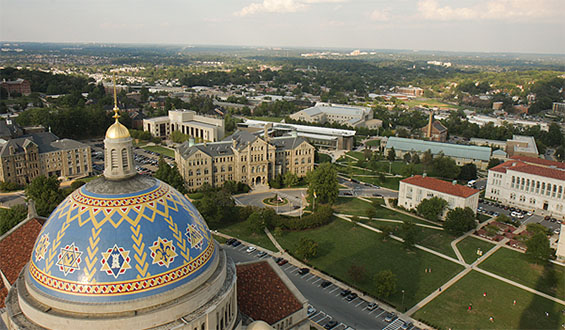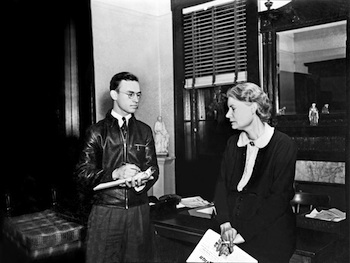There are a number of stunningly bad arguments in Dominic Lynch’s “The Death of Catholic Universities in America.” I limit my focus here to three.
1. Anecdotes are not arguments. Lynch’s basic argument is that the Catholic identity of Catholic universities is dying. How does he know? There has been a bunch of non-Catholic events on Catholic campuses. He names a few, and I don’t doubt that they occurred. The problem is that this is a far cry from an argument. It is basically confirmation bias. He thinks Catholic schools are not Catholic, so he looks around for things that confirm his idea. It is like arguing, “everyone’s favorite flavor of ice-cream is pistachio because I saw a bunch of people buying pistachio ice-cream.”
Perhaps, it would be excusable if no research had been done on Catholic identity. But there has been. A lot. One of the best is “Catholicism on Campus” by Mark Gray and Melissa Cidade. Reviewing HERI data on over 14,000 students, Gray and Cidade compared students at Catholic schools to those at non-Catholic schools on issues like abortion, war, affirmative action, gun control, same sex marriage, poverty alleviation, attending worship, prayer, and reading the Bible. While on average Catholic students at Catholic schools do move away from the church’s teachings over the course of their education, they move away far less than those at non-Catholic schools. In other words, Cidade and Gray’s study indicates two things. First, Catholic colleges and universities are working against an overwhelming and broad cultural movement away from religion. Second, Catholic schools are doing better than every other educational institution to thwart declining religiosity. While this might not be a cause for great rejoicing, it is a genuine argument, with data and analysis.
2. Why would a conservative think “big government” is the solution? Lynch is writing in The Federalist and relying on research by The Cardinal Newman Society. Obviously, he is trying to make a conservative argument. So, why would he draw the very un-conservative conclusion that “Catholic-American institutions of higher education have lost sight of their institutional identities. At this point, only direct intervention from the Vatican can reverse their decline and death.” So, basically, Catholic schools need “big government” to come in and fix them?
Seems like a conservative argument for advancing Catholic identity would favor subsidiarity. Let schools work it out themselves. The market will determine if Catholic schools that promote their Catholic identity can compete against those who don’t. If you don’t do this, if “big government” gets to decide, the market gets corrupted and ends up advancing the ideology of the few against the wants and values of the many. Moreover, the argument goes, if you let people choose, they tend toward goodness and truth. This was John Courtney Murray’s argument about the public consensus in We Hold These Truths. It is the reason for the church’s preference for democracy over communism. It is the basic approach of the Cardinal Newman Society whose main mode of operation is providing information for people to make choices.
3. Catholic does not mean conservative (or progressive). Lynch makes only one statement about what Catholic identity is: “Catholic universities have the advantage of a grounded and time-tested moral foundation.” He mainly defines Catholic identity by what it is not, saying at one point that Catholic identity means not offering courses on “race, class, and gender”:
A number of Catholic institutions engage in deep-seated Progressive politics. “Diversity” offices, drag shows, and programs—even entire courses—focusing on race, class, and gender are the norm.
Really? So, basically, being Catholic means being a white, rich, man? Seems like the Hispanic population in the United States might say something about this, or the church in Africa or Asia, or women who make up HALF of the church. If this is too “progressive” though, I am assuming that we should also exclude Augustine the African, Martin de Porres the illegitimate son of a Spanish nobleman and a freed slave, Francis the beggar, and Theresa of Avila, Lisieux, and Kolkata.
Lynch has basically subordinated Catholicism to a conservative agenda. None of the important works on Catholic identity are defined by the very truncated categories of twenty first century, United States, politics. Catholic education is more expansive and comprehensive than this. Ex corde Ecclesiae claimed that Catholic universities should be communities that “search for meaning in order to guarantee that the new discoveries be used for the authentic good of individuals and of human society as a whole.” (§ 7) These institutions should explore “how knowledge is meant to serve the human person” (§ 18), and, in doing so, foster an education that “forms men and women capable of rational and critical judgment and conscious of the transcendent dignity of the human person.” (§ 49).
If you want to go further back, you can go to Cardinal Newman’s The Idea of a University. There he argues that theology is key to university education, that it is the “science of the sciences.” Its role is not to tell other disciplines what to do or how to do it. Instead, it helps each discipline see its relationship to the others. Theology helps disciplines to better understand themselves and, in doing so, their unique contribution to “universal” knowledge.
There are countless other visions that do not subordinate Catholicism to a conservative or progressive agenda. If Lynch is more Catholic than conservative, he should familiarize himself with some of these works, use them to attend to and analyze data, and make an argument consistent with his principles. This is what is needed. Obviously there is work to be done. The fact that a Catholic university produced someone who doesn’t do this makes it clear.




Jason–
Thank you for highlighting these bad arguments. Lynch’s arguments sound as if they are ignoring the fundamental grounds of the unity of faith and reason and a particular view of the human person – the key foundation pieces of Fides et Raio and Ex Corde – in favor of making the “creedal commitments” of moral norms the real mark of Catholic identity. Terribly reductionistic. At the Mount, we rely on Morey and Piderit’s far more nuanced Catholic Higher Education (Oxford UP, 2011) as the playbook – above all, Morey and Piderit do well because they focus not on anecdotes but on reasonable institutional structures at universities, plus they recognize that there is not “one way” to be Catholic. Their four models – Catholic immersion, Catholic persuasion, Catholic diaspora, and Catholic cohort – all have distinctiveness and can all be models for robust Catholic identity. Books like Lynch’s just distract from the good work that is actually going on.
Lynch is an undergrad; let’s be gentle.
Thank you, thank you, thank you. I think we need more classes on race, class, and gender, and the idea that these are emblematic of a non-Catholic ethos is just silly. I agree with David that Morey and Piderit’s analysis is far more compelling–and useful–for this debate. At USD we’re gearing up for the drag show again on April 16th and this year the students in my Sexual Ethics class will display their research poster presentations in the lobby and gathering space outside the auditorium–as just one way that we are engaging the complexity of these issues of sexual ethics both in performance and academic analysis of contested claims. I think “direct intervention from the Vatican” would be disastrous. The visitation of religous women’s communities was not perceived as dialogical but rather as punitive; I hope the church learned from that experience and can think more creatively about how to promote Catholic identity without imposing one narrow theological/ecclesial agenda.
What is the actual reason or concern for this post? You say there is no evidence, it is anecdotal: sure, it is a piece of online journalism written by some kid. Written about his own institution, presumably, where he dwells. Anecdotes are powerful in light journalistic writing. We academics depend upon anecdote all the time when we marshal ‘evidence’ for grievances, or look for signs of a downward turn in events around us.
Second, admitting that Lynch did not read the same book that King has, one might nevertheless note that Gray and Cidade work with data from self-reporting individuals (as psychologists, like Christian Smith, should). This kid seems to be talking about a. institutional actions and/or b. public forms of witness that suggest approval of politics or moral positions not very reflective (whether intentionally or not) of Catholic doctrine. These are not unrelated, but again, I do not read him to be talking about ‘the attitudes of Catholic kids today,” but rather institutional promotion of activities. (To this, in particular, your strongest charge is that Lynch uses data coming from a Cardinal Newman Society publication: let us all now demonize it. Ok, but are these ‘anecdotal tidbits’ correct or false? or is the offense to King that they are reported in a Cardinal Newman Society publication? The former should matter more than the latter.)
Third, King revels in the ad hominem attack — ‘being Catholic’ means being white, male and rich… which sadly illustrates the pretty shallow point the original author is making about usual discourses of higher education. If anything, it is surprising to me how boring and conventional campus ‘radicalism’ is starting to sound.
Fourth, Lynch does not use terms of conservative vs. progressive; King does, and shows thereby that the title and assumed politics of the publication mean that the author is himself a polarizer (and not King?).
Finally — ‘big government Vatican’? Yikes, scary, like saying Canadians and their health care are wicked ‘socialists.’ There is not even a good rhetorical reason for trying to squeeze the church hierarchy into the desiccated categories of American politics. Big government — shame on you. As a remedy to this sloppiness, I suggest a quick read of Leo XIII’s ‘Libertas Praestantissimum’ before bedtime. Bracing. In fact, I am glad to see even those nasty, privileged American undergraduates caring about stuff, in general, anything really, let alone their faith! The kid is not out to compete with Morey/Piderit or the ‘latest research’; stop stroking the kid’s ego, and give him a break.